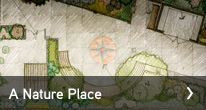Open Voices is taking the opportunity to get to know some of the different team members from our National Awards grantee projects. You can find previous interviews with other team members here.
Time spent in a hospital is filled with a lot of challenges, whether it is on the doctor’s side of trying to provide the best medical care, or families and patients staying strong through incidents of injury or illness. Having a place in a medical facility to help relieve some of the stress that comes with those trying times seemed like a perfect opportunity for Dr. Alar Mirka and his research team to study whether a sacred space like a garden could do the trick.
Dr. Mirka manages all clinical research activity at Legacy and works with a variety of research teams across the Legacy facilities, and will be leading the three studies associated with our grantee project A Nature Place. He has had extensive experience as a practicing internist, which allows for him to understand the kinds of environments and stressors under observation in this project.
We had the opportunity to speak with Dr. Mirka about his experience so far working on A Nature Place.
Open Voices: What is your role in A Nature Place?
Alar Mirka: I’m acting as the Director of Clinical Research at Legacy Health. We have the Legacy Research Institute that does basic science and translational research, as well as clinical research and surgical education and innovation, using various types of educational tools for continuing education for surgeons. We were approached by Teresa Hazen when they were looking at a grant to put in a new healing garden, and were informed that there was a research component to it, and we were happy to help out.
Open Voices: What previous personal research experiences do you think will serve you in these upcoming studies?
Mirka: I have had many occasions where families of patients in intensive care units were experiencing high levels of stress, difficult discussions and difficult decisions to be made about patient care. We recognized there wasn’t a good place for family to come together or meet with physicians to discuss life and death matters. At each of the Legacy hospitals they’ve been trying to build in to the health system places where people can go for support. The garden model has really expanded and it’s been wonderful to be involved in the clinical side of it. When I had a chance to take part in a research project looking at the outcomes it was exciting to me to give support to something we should have been doing from my experience on the clinical side.
Open Voices: As a medical professional yourself, how would you describe the role the environment plays on the stress felt by health care professionals?
Mirka: The environment is critical. From working on this research project, an OB/GYN remarked that he was visiting a hospital in Australia and was attending a surgery as an observer and realized that there was a window in the operating room that looked out onto a distant hillside landscape scene. He looked back and realized that it was the first time he had ever seen a window in an operating theater. Some surgeries are marathon sessions, 8 to 12 hours even, it would be very different to be able to stop and take a deep breath during a surgical procedure and look out at nature and the real world.
Imagining that and thinking about the fact that you could possibly walk in and out of a garden while crossing into a different medical unit, is reinvigorating. It may not last very long, but that brief relief is sure to be restorative.
Open Voices: What have you found most intriguing or challenging about this project thus far?
Mirka: Not knowing what we’re going to find on the study on the women going into labor, with so many variables, whether the impact on one patient will be different from another. Also, not really knowing what physiological variables we’ll be measuring, whether it is how well the child comes through labor, their core pH, which is the acidity of the blood and tells us if the baby has been through a lot of stress from the birth. We will see whether we can attribute those differences to the garden or not.
I am also really impressed with the staff. They are very excited about these studies. When we get the nurses and staff working in the different units together, they are really what keep us going and reminding us that it is an important part of their day, and an important experiment to do.

